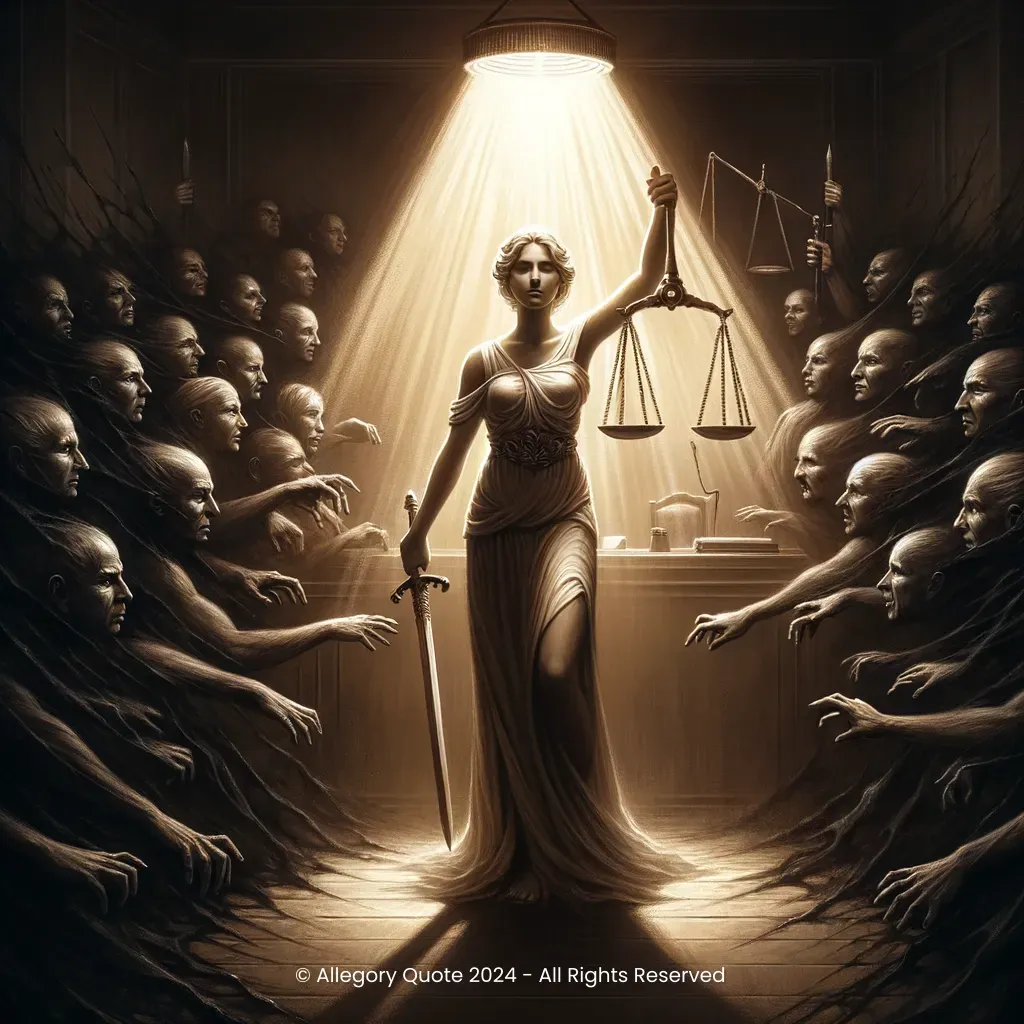”Facts are stubborn things; and whatever may be our wishes,
our inclinations, or the dictates of our passion,
they cannot alter the state of facts and evidence“

0
0
0
0
- Meaning
- The quote emphasizes the intransigent nature of facts. No matter how strong our emotions, desires, or biases, reality remains unchanged by them. This reflects a fundamental principle in both scientific inquiry and rational discourse—that objective reality must be acknowledged and cannot be influenced by subjective preferences or passions.
- Allegory
- In the image, Lady Justice represents the embodiment of impartiality and truth, holding scales to symbolize weighing evidence without bias and a sword to signify the power of truth and justice. The courtroom backdrop with shadows signifies the constant presence of biases, emotions, and subjective influences in our lives. The bright, unwavering light shining on Lady Justice illustrates the idea that facts and evidence are immutable and stand apart from these shadows. This visual allegory underscores the quotation’s message that no matter our wishes or passions, facts remain steadfast and unchanging.
- Applicability
- This phrase can be a powerful reminder in personal life to stay grounded in reality, even when emotions run high. It underscores the importance of honesty and integrity, especially in decision-making processes. Recognizing that facts are immutable can help individuals remain clear-headed and rational, particularly in stressful or emotionally charged situations.
- Impact
- This phrase has had a significant impact on legal and scientific communities, often cited in courtrooms, debates, and discussions to emphasize the importance of evidence over emotion. It has been invoked to advocate for rationalism and objectivity in various fields.
- Historical Context
- The quote was delivered by John Adams in his 1770 defense of British soldiers involved in the Boston Massacre. Adams was emphasizing the importance of objectivity and evidence in the pursuit of justice, a principle that was crucial to the legal system and the burgeoning ethos of the American Revolution.
- Criticisms
- While the phrase is broadly accepted and rarely critiqued directly, it can be seen as dismissive of the complex interplay between emotion and reason in human experience. Some might argue it underestimates the role of emotions in motivating action and decision-making.
- Variations
- Variations of this phrase might exist across different cultures that value truth and objectivity. In general, many cultures have proverbs or sayings that stress the importance of acknowledging reality and avoiding deception.
-

I tremble for my country when I reflect that God is just; that his justice cannot sleep forever.
-

It is better to be alone than in bad company.
-

National honor is national property of the highest value.
-

Reputation is an idle and most false imposition; oft got without merit, and lost without deserving.
-

If men were angels, no government would be necessary.
-

Nothing will come of nothing.
-

Love, which absolves no loved one from loving, seized me so strongly with his charm that, as you see, it does not leave me even now.
-

It is a damn poor mind indeed which can't think of at least two ways to spell any word.
-

The golden age is before us, not behind us.
No Comments